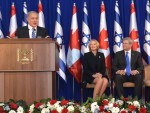Last week, Malala Yousafzai and Kailash Satyarthi were jointly awarded the Nobel Peace Prize. The former may be more familiar to most of the world than the latter but, in pairing the two, the prize committee was making some very blunt statements about girls, children and long-held international enmities.
Yousafzai is a Pakistani Muslim. When she was 11 years old, she began writing a blog for the BBC about life under the Taliban in the Swat Valley area of northwest Pakistan. Her family operated schools in the area and the Taliban banned girls from attending. She persisted – not only in attending school but in becoming an international voice for girls’ education. When she was 15, in 2012, a gunman boarded her school bus, asked for her by name and shot her. Yousafzai survived and continues her activism with more determination.
Satyarthi is an Indian Hindu who has devoted himself to the cause of children’s rights, particularly opposing child labor and advancing education for all. His organization has rescued and rehabilitated 80,000 child laborers.
The Nobel’s choice of Yousafzai and Satyarthi made a statement not only about the value of childhood and education, but by choosing laureates from the belligerent neighboring countries of India and Pakistan, they were also underscoring the need to overcome long-standing animosities for the greater good.
There are many reasons why children do not receive the education they deserve – intertwined factors of poverty, violence, oppression, forced early marriage and more – but gender is a particularly gnawing factor in many parts of the world. The more a country limits girls’ education, the more backward the country is – and not in the culturally relativist sense of backwardness that is no longer politically palatable terminology, but in objective, empirical, economic terms. The statistics are staggering.
Every extra year of education a girl in the developing world receives can increase her income 15 to 25 percent. When mothers are responsible for household income, there is a 20 percent increase in child survival rates. Every additional year of schooling a mother receives reduces infant mortality by five to 10 percent.
The more education a girl receives, the fewer children she is likely to have – and they are likely to be healthier and to go to school themselves. And education reduces the likelihood that a girl will be pushed into marriage in adolescence.
As is so often the case, oppression of one group harms the larger society. Ameliorating the oppression of some advantages the whole. A 10 percent increase in girls’ school attendance can increase a country’s GDP by three percent. If all the moral and human justifications do not persuade governments, the numbers should convince them that girls’ education is an economic benefit.
Israel is a case study. From before the state was proclaimed, women have played central roles and been leaders in all aspects of civil society. It is not a coincidence that Israel – a barren, resourceless nascent state in 1948 – has emerged as one of the world’s most successful economies. There are a number of obvious and less obvious reasons for this, but the inclusion of women is one of them.
This is not to suggest that everything is roses. Men still dominate professorships and the sciences in Israel. Arab schools in Israel receive fewer resources than Jewish schools, though efforts are advancing to close this gap. (Christian Arabs, though, statistically have better graduation exam results than Muslim or Jewish students and attend university in numbers above the Israeli median.) Israel is also investing large sums in revamping Charedi education to better prepare religious men and women for the workforce.
But girls in Israel are more likely than boys to graduate high school and continue to university. The high school dropout rate for boys is almost three times that of girls. More than 56 percent of students in university are female.
Of course, such is the state of the world today that what lessons Israel may offer will be rejected out of hand due to the source but, by selecting an Indian and a Pakistani, the Nobel committee was clearly making a statement that urgent issues must be addressed regardless of old antagonisms.
The Nobel committee was also clearly recognizing the impact that a single person – or two individuals – can have on the way the world thinks and behaves.

